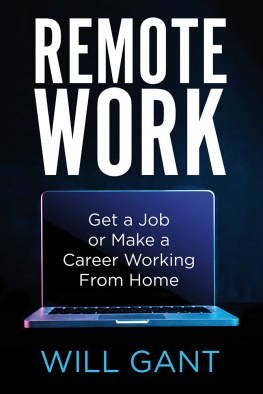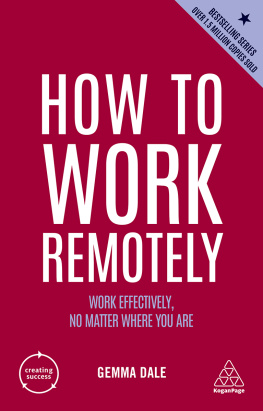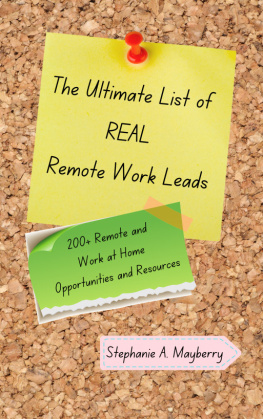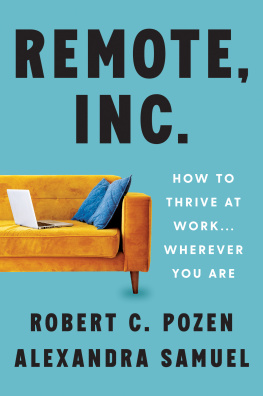Will Gant - Remote Work: Get a Job or Make a Career Working From Home
Here you can read online Will Gant - Remote Work: Get a Job or Make a Career Working From Home full text of the book (entire story) in english for free. Download pdf and epub, get meaning, cover and reviews about this ebook. year: 2020, genre: Romance novel. Description of the work, (preface) as well as reviews are available. Best literature library LitArk.com created for fans of good reading and offers a wide selection of genres:
Romance novel
Science fiction
Adventure
Detective
Science
History
Home and family
Prose
Art
Politics
Computer
Non-fiction
Religion
Business
Children
Humor
Choose a favorite category and find really read worthwhile books. Enjoy immersion in the world of imagination, feel the emotions of the characters or learn something new for yourself, make an fascinating discovery.
- Book:Remote Work: Get a Job or Make a Career Working From Home
- Author:
- Genre:
- Year:2020
- Rating:5 / 5
- Favourites:Add to favourites
- Your mark:
- 100
- 1
- 2
- 3
- 4
- 5
Remote Work: Get a Job or Make a Career Working From Home: summary, description and annotation
We offer to read an annotation, description, summary or preface (depends on what the author of the book "Remote Work: Get a Job or Make a Career Working From Home" wrote himself). If you haven't found the necessary information about the book — write in the comments, we will try to find it.
Will Gant: author's other books
Who wrote Remote Work: Get a Job or Make a Career Working From Home? Find out the surname, the name of the author of the book and a list of all author's works by series.
Remote Work: Get a Job or Make a Career Working From Home — read online for free the complete book (whole text) full work
Below is the text of the book, divided by pages. System saving the place of the last page read, allows you to conveniently read the book "Remote Work: Get a Job or Make a Career Working From Home" online for free, without having to search again every time where you left off. Put a bookmark, and you can go to the page where you finished reading at any time.
Font size:
Interval:
Bookmark:

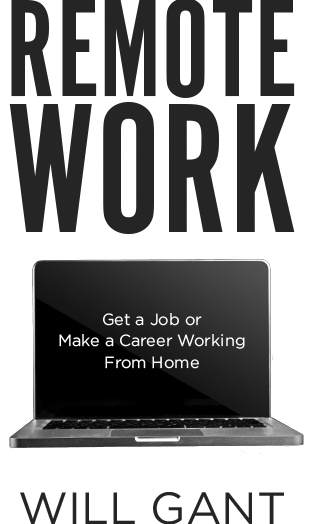
Bio
Will Gant is an author, software developer and consultant with over 20 years of software development experience. He has worked remotely in a variety of roles, including management, in both local and distributed teams. Additionally, on more than one occasion, he has spearheaded the efforts to implement remote work processes in a fully onsite team.
Dedication
I would like to dedicate this book to my parents, who both taught me to look for opportunities for a better life and to put in the work to make them happen. Your parents have a lot of input in making you who you are, where you are. Ive been blessed with having two who prioritized making me ready for the world, in terms of attitude, in terms of work ethic, and in terms of going through the pain of learning to achieve growth.
Foreword
I remember when I first started out my programming career that one of my biggest goals was to be able to someday get a job that allowed me to work remotely.
I had dreams of working whatever hours I wanted, rolling out of bed in the morning and going across the hall to my office and being able to work all night instead of during the dayif I wished.
Eventually I did get that remote work job and the first remote work job I got, I pretty much failed at. I spent most of my day procrastinating and playing online games instead of actually working and then I would scramble at the end of the week to get everything done.
My biggest problem was that I was not prepared, I didnt know what to expectand most importantlyI didnt know how to succeed.
Thats why when Will suggested this book I was excited. I knew that if I had many misconceptions about remote work that caused me to initially fail, that many other people did as well and that someone needed to finally write the authoritative guide on the subject.
Im happy to say that Will has done just that. Youll find everything you need to know about remote work in this book, starting with what the benefits (and cons are), how to actually get, or make, a remote working job, how to handle working remote, and much, much more. Pretty much every question you have about working remotely will be answered in this book and hopefully youll be able to avoid the same mistakes that I did.
I also happen to know Will personally and I know that he knows what hes talking about when it comes to remote work. Will has successfully worked many remote jobs, dealt with just about every issue that can come up, working from home, and has lived to tell the tale.
So, I know that you are in good hands when Will tells you how to successfully work remotely, whether you are starting your first remote job, looking for one, or trying to convince your boss that letting you work remote will be the best thing for you and the company.
John Sonmez,
Founder of Simple Programmer
March 10th, 2020
San Diego, CA
Chapter
Why Work Remote
If you are reading this, you probably have at least some desire to work remotely. While we all have our individual reasons, people either tend to love the idea or hate it.
For those who love working remotely, it may mesh well with longer-term goals in life. For others, it helps improve their quality of life by saving them money, time, and stress. And yet for others, it actually makes it possible for them to have a career at all.
However, remote work also has its detractors. For some of those people, especially those who tend to be more social, remote work sounds like a terrible level of isolation. For those who lack discipline or are concerned about how management will perceive remote workers, working remotely sounds like a recipe for job loss.
Many managers have difficulty evaluating how hard someone is working without seeing them at work, and it can be difficult to prove to them that you are working if you arent in the office.
At the very least, if you decide to work remotely, you can almost certainly count on dealing with one or more people who are strongly against the idea.
Since the perceptions of remote work vary widely across the population and are polarizing in some circles, its a good idea to be aware of the advantages that remote work brings to the table for those engaged in the practice.
Not only will these advantages help you convince others of the value of your own remote work, but sometimes those who are against the idea will see the value of the arrangement for themselves. They may even eventually realize that a companys insistence on employees being in the office is hamstringing the company and wasting time and money while making the lives of their employees measurably worse.
The people who offer strong opinions on your remote work are not limited to those who work with you. In fact, some of the loudest voices youll hear will be from friends, family, and even random strangers in the grocery store. In general, the average person doesnt really understand remote work and is often hostile to the idea.
However, the disagreement of others is not a good basis for evaluating whether something is a good idea for you personally. Were going to discuss some of the benefits that you can expect from working remotely.
Realizing these benefits will make it a lot easier to ignore the people who are against the idea of remote work when you cant convince them, and its also a lot easier to bring them around if you are confident in the benefits yourself.
Remote work necessitates a number of changes in the way that companies (and the individuals within them) operate. This radical restructuring changes the way that work is conducted and evaluated and drastically alters your relationship to work.
These changes also present new challenges and opportunities. In this first chapter, well discuss some of the opportunities while leaving the challenges for later.
The Cost of Your Commute
The most obvious thing that changes when you work remotely is that you wont have to travel to the office every day. While most people acknowledge that their commute is usually an annoying waste of time, most of us dont really know how harmful our commute actually is.
From personal experience, I can tell you that once you find out how expensive your commute really is, youll also be far more motivated to rid yourself of it. Knowing what your commute costs will also help you in negotiations for remote work.
The first and most obvious cost imposed by commuting by car are the costs of gas and vehicle wear and tear. As of 2018, the average American commute is 16 miles each way and usually constitutes a little less than an hour of driving each day.
As of 2015, the average American spends $2,600 each year commuting to work. In some cities, the numbers are far worse, with many commutes being double the average or even more. Even for non-Americans, commutes can be very costly, especially if you are driving yourself to the office. Fuel and vehicle maintenance will always have a cost no matter where you live.
In addition to the obvious costs associated with a vehicle, there are many other costs that you probably havent considered. Vehicle insurance costs often increase based on mileage, as do the risks of an accident.
Additionally, you may have to pay for parking and other fees. These add up over time and dont tend to make it into statistics, even though they do hit your bank account.
While using public transportation is often cheaper than commuting by car, it comes with its own issues. First among them is that it still costs money and may also take longer than a trip by car. Additionally, public transport in many places is severely lacking and fairly unpleasant. If it works, it can save you some money but not nearly enough to make commuting a good idea.
Font size:
Interval:
Bookmark:
Similar books «Remote Work: Get a Job or Make a Career Working From Home»
Look at similar books to Remote Work: Get a Job or Make a Career Working From Home. We have selected literature similar in name and meaning in the hope of providing readers with more options to find new, interesting, not yet read works.
Discussion, reviews of the book Remote Work: Get a Job or Make a Career Working From Home and just readers' own opinions. Leave your comments, write what you think about the work, its meaning or the main characters. Specify what exactly you liked and what you didn't like, and why you think so.

